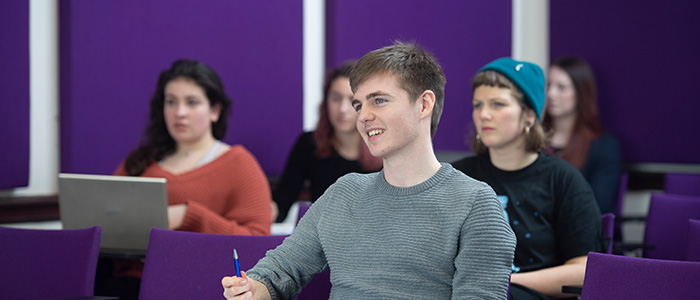Mental Health PhD/iPhD

Our research strength is identifying the causes of mental disorders and suicide to develop clinical trials of novel complex interventions.
- PhD: 3-4 years full-time; 5 years part-time;
- IPhD: 5 years full-time;
Research projects
+++
Identifying the mechanism of action of physical activity in treating depression
Supervisor: Dr Craig Melville
Project outline: Depression is a common and debilitating illness, affecting over 300 million people worldwide. There is a growing evidence base on the clinical effectiveness of physical activity for the management of depression. Researchers have proposed biological, social and psychological mechanisms of action by which physical activity helps manage depressive symptoms. In keeping with theories informing behavioural activation, preliminary experimental evidence suggests that the mechanism of action of physical activity may be due to direct effects on positive affect and physiological arousal.
Summary aim: To examine the acute and prolonged impact of physical activity on affect, arousal and depressive symptoms.
Techniques used:
- Experimental and field-based research skills
- Subjective and objective measurement of the response to physical activity
- Linear and non-linear statistical methods
References
- Harvey et al. (2010) Physical activity and common mental disorders. British Journal of Psychiatry; 197: 357-364.
- Kopp M, Steinlechner, Ruedl G et al. (2012). Acute effects of brisk walking on affect and psychological well-being in individuals with type 2 diabetes. Diabetes Research and Clinical Practice; 95:25-29.
- Joseffson et al. (2014) Physical exercise intervention in depressive disorders: Meta-analysis and systematic review. Scandinavian Journal of Medicine & Science in Sports 24, 259-272.
Contact
Dr Craig Melville, University of Glasgow, School of Health and Wellbeing, Mental Health and Wellbeing, Gartnavel Royal Hospital Glasgow, G12 0X.
Tel 0141 211 0690
---
Overview
Mental disorders are the leading global cause of disability and the World Health Organisation estimates that over 0.8 million deaths are due to suicide associated with mental disorders. Therefore, research on mental disorders and suicide is vital to reducing the global burden of disease.
Our more fundamental research examines the contribution of psychological, biological and social factors to the causation of mental disorders and suicidal behaviours. Postgraduate research students working in this area can develop cutting edge, skills relevant to experimental, epidemiological, qualitative and neuroimaging research methods.
A translational approach makes use of the evidence from fundamental research to develop innovative therapeutic approaches for the prevention and treatment of mental disorders and suicidal behaviours. We have expertise in clinical trial methodologies to evaluate complex interventions and implementation science. Interdisciplinary research groups provide postgraduate research opportunities in these themes:
- suicidal behaviour research
- psychological therapies
- bipolar disorder, schizophrenia and depression
- big data and mental disorder
- neuropsychology of neurological disorders
- autism spectrum disorders and intellectual disabilities
- attachment, childhood maltreatment and mental disorders
Individual research projects are tailored around the expertise of principal investigators within the School of Health and Wellbeing. Our supervisors are from clinical and scientific backgrounds and use a variety of approaches including experimental psychology and psychophysiology, functional neuroimaging, multilevel modelling of complex datasets, health services research, qualitative, and clinical trial methodologies. We have excellent engagement with the NHS and with service user and carer organisations.
Specific areas of interest include:
- Experimental approaches to understanding suicidal behaviours and self-harm
- Acceptance and commitment therapy for severe mental disorders
- Interpersonal and attachment based models of affect regulation
- Developing interventions for detecting, responding to and preventing relapse in psychosis
- Mother-infant attachment in depression, bipolar disorder and psychosis
- Psychological therapies for negative symptoms of schizophrenia
- Neuroinflammatory models of mental disorders
- Low intensity psychological therapies for mental disorders
- Understanding the outcomes of traumatic brain injury
- Autism spectrum disorders and comorbid mental disorders
- Longitudinal studies of the health of people with intellectual disabilities
- Multimorbidity and mental disorders
- Physical activity and weight management programs for people with intellectual disabilities
- Assistive technologies for adults with specific neuropsychological impairments
- Identifying shared genetic risk factors for mental disorders and cardiovascular disease
- Attachment, Childhood maltreatment and mental disorders
- Socio-ecological models of stigma and discrimination in vulnerable populations
Study options
PhD
- Duration: 3/4 years full-time; 5 years part-time
Individual research projects are tailored around the expertise of principal investigators.
Integrated PhD programmes (5 years)
Our Integrated PhD allows you to combine masters level teaching with your chosen research direction in a 1+3+1 format.
International students with MSc and PhD scholarships/funding do not have to apply for 2 visas or exit and re-enter the country between programmes. International and UK/EU students may apply.
Year 1
Taught masters level modules are taken alongside students on our masters programmes. Our research-led teaching supports you to fine tune your research ideas and discuss these with potential PhD supervisors. You will gain a valuable introduction to academic topics, research methods, laboratory skills and the critical evaluation of research data. Your grades must meet our requirements in order to gain entry on to your pre-selected PhD research project. If not, you will have the options to pay outstanding MSc fees and complete with masters degree only.
Years 2, 3 and 4
PhD programme with research/lab work, completing an examinable piece of independent research in year 4.
Year 5
Thesis write up.
Entry requirements
A 2.1 Honours degree or equivalent.
English language requirements
For applicants whose first language is not English, the University sets a minimum English Language proficiency level.
International English Language Testing System (IELTS) Academic module (not General Training)
- 6.5 with no subtests under 6.0
- Tests must have been taken within 2 years 5 months of start date. Applicants must meet the overall and subtest requirements using a single test.
Common equivalent English language qualifications accepted for entry to this programme:
TOEFL (ibt, my best or athome)
- 79; with Reading 13; Listening 12; Speaking 18;Writing 21
- Tests must have been taken within 2 years 5 months of start date. Applicants must meet the overall and subtest requirements , this includes TOEFL mybest.
Pearsons PTE Academic
- 59 with minimum 59 in all subtests
- Tests must have been taken within 2 years 5 months of start date. Applicants must meet the overall and subtest requirements using a single test.
Cambridge Proficiency in English (CPE) and Cambridge Advanced English (CAE)
- 176 overall, no subtest less than 169
- Tests must have been taken within 2 years 5 months of start date. Applicants must meet the overall and subtest requirements using a single test.
Oxford English Test
- Oxford ELLT 7
- R&L: OIDI level no less than 6 with Reading: 21-24 Listening: 15-17
- W&S: OIDI level no less than 6
Trinity College Tests
Integrated Skills in English II & III & IV: ISEII Distinction with Distinction in all sub-tests.
University of Glasgow Pre-sessional courses
Tests are accepted for 2 years following date of successful completion.
Alternatives to English Language qualification
- Degree from majority-English speaking country (as defined by the UKVI including Canada if taught in English)
- students must have studied for a minimum of 2 years at Undergraduate level, or 9 months at Master's level, and must have complete their degree in that majority-English speaking country and within the last 6 years
- Undergraduate 2+2 degree from majority-English speaking country (as defined by the UKVI including Canada if taught in English)
- students must have completed their final two years study in that majority-English speaking country and within the last 6 years
For international students, the Home Office has confirmed that the University can choose to use these tests to make its own assessment of English language ability for visa applications to degree level programmes. The University is also able to accept UKVI approved Secure English Language Tests (SELT) but we do not require a specific UKVI SELT for degree level programmes. We therefore still accept any of the English tests listed for admission to this programme.
Pre-sessional courses
The University of Glasgow accepts evidence of the required language level from the English for Academic Study Unit Pre-sessional courses. We also consider other BALEAP accredited pre-sessional courses:
Fees and funding
Fees
2024/25
- UK: £4,786
- International & EU: £30,240
Prices are based on the annual fee for full-time study. Fees for part-time study are half the full-time fee.
Irish nationals who are living in the Common Travel Area of the UK, EU nationals with settled or pre-settled status, and Internationals with Indefinite Leave to remain status can also qualify for home fee status.
Alumni discount
We offer a 20% discount to our alumni on all Postgraduate Research and full Postgraduate Taught Masters programmes. This includes University of Glasgow graduates and those who have completed Junior Year Abroad, Exchange programme or International Summer School with us. The discount is applied at registration for students who are not in receipt of another discount or scholarship funded by the University. No additional application is required.
Possible additional fees
- Re-submission by a research student £540
- Submission for a higher degree by published work £1,355
- Submission of thesis after deadline lapsed £350
- Submission by staff in receipt of staff scholarship £790
Depending on the nature of the research project, some students will be expected to pay a bench fee (also known as research support costs) to cover additional costs. The exact amount will be provided in the offer letter.
Funding
The iPhD is not supported by University of Glasgow Scholarship/Funding
- BBSRC Doctoral Training Partnerships
- External funding information
Support
The College of Medical, Veterinary and Life Sciences Graduate School provides a vibrant, supportive and stimulating environment for all our postgraduate students. We aim to provide excellent support for our postgraduates through dedicated postgraduate convenors, highly trained supervisors and pastoral support for each student.
Our over-arching aim is to provide a research training environment that includes:
- provision of excellent facilities and cutting edge techniques
- training in essential research and generic skills
- excellence in supervision and mentoring
- interactive discussion groups and seminars
- an atmosphere that fosters critical cultural policy and research analysis
- synergy between research groups and areas
- extensive multidisciplinary and collaborative research
- extensive external collaborations both within and beyond the UK
- a robust generic skills programme including opportunities in social and commercial training
Research environment
The Mental Health and Wellbeing Research Group is based within the School of Health and Wellbeing, under the Directorship of Professor Jill Pell. This is a partnership between the College of Medical, Veterinary and Life Sciences and the College of Social Sciences. This cross-disciplinary group includes:
- the MRC/CSO Social and Public Health Sciences Unit
- our research groups in mental health
- public health
- health economics and health technology assessment
- general practice and primary care
- and the Robertson Centre for Biostatistics & Clinical Trials Unit
We have over 300 staff and 130 doctoral students, our students receive regular seminar programmes and thematic workshops from a wide range of national and international speakers.
We deliver world-class research-informed postgraduate training in clinical psychology, global mental health and neuropsychology. We have excellent links with NHS Scotland, in particular the NHS Research Scotland Mental Health Network and Clinical Research Facilities based in Glasgow and elsewhere.
The Mental Health and Wellbeing Research Group is at the forefront internationally of the development and evaluation of new psychosocial interventions, with trials of therapeutic and complex interventions in adult mental health, intellectual disability, acquired brain injury, suicide risk and parent-infant mental health. These trials are underpinned by a programme of work aimed at understanding the psychological, social, interpersonal and biological mechanisms of change. Our focus on epidemiology is charting trajectories to determine when, where and how to intervene.
How to apply
Identify potential supervisors
All Postgraduate Research Students are allocated a supervisor who will act as the main source of academic support and research mentoring. You may want to identify a potential supervisor and contact them to discuss your research proposal before you apply. Please note, even if you have spoken to an academic staff member about your proposal you still need to submit an online application form.
You can find relevant academic staff members with our staff research interests search.
IPhD applicants do not need to contact a supervisor, as you will choose from a list of IPhD projects. Each project has named supervisors.
Gather your documents
Before applying please make sure you gather the following supporting documentation:
- Final or current degree transcripts including grades (and an official translation, if needed) – scanned copy in colour of the original document.
- Degree certificates (and an official translation, if needed): scanned copy in colour of the original document
- Two references on headed paper and signed by the referee. One must be academic, the other can be academic or professional [except iPhD applicants, where only one academic or professional reference is required]. References may be uploaded as part of the application form or you may enter your referees contact details on the application form. We will then email your referee and notify you when we receive the reference. We can also accept confidential references direct to rio-researchadmissions@glasgow.ac.uk, from the referee’s university or business email account.
- Research proposal, CV, samples of written work as per requirements for each subject area. iPhD applicants do not need to submit any of these as you will start your programme by choosing a masters.
- Completed College of MVLS Postgraduate Research Cover Letter
Notes for iPhD applicants
- add 'I wish to study the MSc in (select MSc from IPhD project choices) as the masters taught component of the IPhD' in the research proposal box
- For supervisor name, please ensure you write the named supervisors from your chosen IPhD project.
Contact us
Before you apply
PhD/MSc/MD: email mvls-gradschool@glasgow.ac.uk
iPhD: email mvls-iphd@glasgow.ac.uk
After you have submitted your application
PhD/MSc/MD/iPhD: contact our Admissions team
Any references may be submitted by email to: rio-researchadmissions@glasgow.ac.uk

Our research environment



